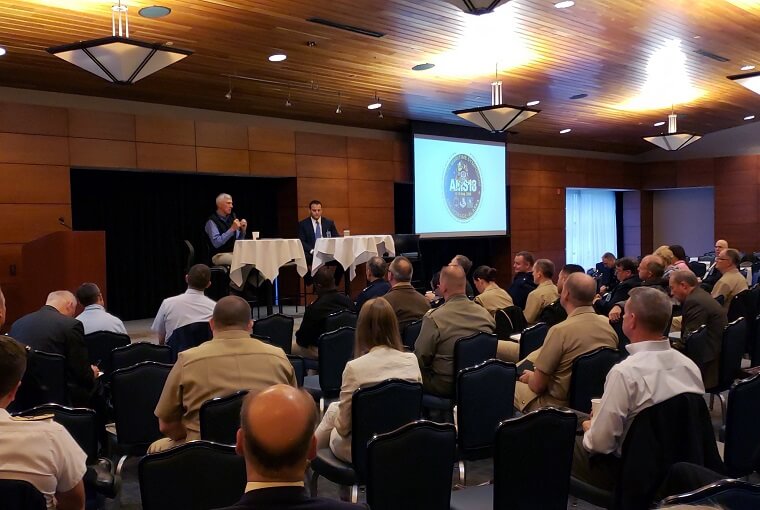Symposium tackles new defense, security challenges of an opening Arctic

ANCHORAGE, ALASKA – Senior U.S. military leaders with responsibilities in Europe, North America, and the Pacific gathered at Alaskan Command in Anchorage, Alaska for the inaugural Arctic Maritime Symposium August 14-16. The event was hosted by Alaskan Command in partnership with U.S. Naval War College (NWC) and served as a first step to adopting a joint and interagency approach to understanding and protecting America’s security interests in the Arctic region.
“Alaska is the cornerstone of America’s Ballistic Missile Defense, the hub of air combat power for the Arctic and Pacific, and the strategic platform for expeditionary forces,” said Alaska Sen. Dan Sullivan. “We’re clearly building those up, but we need to be the logistics base for America’s power projection.”
“Rapid change in the Arctic and increased competition from China and Russia expose new challenges and opportunities for Combatant Commanders,” said Air Force Lt. Gen. Kenneth Wilsbach, commander, Alaskan Command. “This symposium allows us to better understand threats to our interests, strengthen relationships, and deepens our knowledge of the shared responsibilities that an opening Arctic brings to America and our allies and partners.”
As sea-ice retreats and maritime activity increases, America’s sea services: Navy, Marine Corps and Coast Guard, will be called upon to deter and defend against threats to America’s northern flank.
For the Secretary of the Navy Richard Spencer, it comes down to talking less and doing more. The symposium took place a day after Spencer’s visit to Alaska.
“Finish studying, start building,” Spencer said. “We need to have on-sea presence now that we have a blue water Arctic more times than not.”
However, the current lack of infrastructure and ice-capable surface ships makes the prospect of developing an Arctic presence a daunting task for the assembled leaders.
“It requires leadership in Washington to force people to make financial commitments,” noted Adm. Sam Locklear, former commander of U.S. Pacific Command. “The only way you get a true interagency effect in this country, it has to come from the White House.”
There was a consensus among the leaders in attendance to refresh the National Strategy for the Arctic Region.
“We need to develop a cogent national strategy to set a whole of government approach that will drive refinements to our defense strategy and down the line,” argued Air Force Brig. Gen. John Hillyer, mobilization assistant to the director of operations, headquarters, U.S. Pacific Command. “Let strategy drive the requirements, resources, and priorities.”
Air Force Gen. Terrence O’Shaughnessy, commander, U.S. Northern Command and North American Aerospace Defense Command, delivered an unequivocal message about the importance of Alaska to U.S. national security and homeland defense.
“As we move forward, our collective efforts must ensure that we are ready to operate in and through the Arctic, in all domains and in all scenarios,” said O’Shaughnessy.
The Navy is trying reclaim and redevelop skills, capabilities, and equipment that atrophied after the Cold War, which are required for operating in the far north.
“We have to get the reps and sets in our training evolutions so we’re ready when we’re called upon to the Arctic,” said Rear Adm. Douglas Perry, director, Joint and Fleet Operations, U.S. Fleet Forces Command. “Table-top exercises will help us understand what forces we’re going to send.”
“The Naval War College is uniquely positioned to help the Navy and DoD think through the challenges posed by sustaining both stability and security in the Arctic,” noted Tom Culora, dean, NWC’s Center for Naval Warfare Studies. “This symposium helped the war college team here supporting this event gain a deeper understanding of the needs and identifying the keys players who will be instrumental in developing policy and leading activities in the Arctic.”
